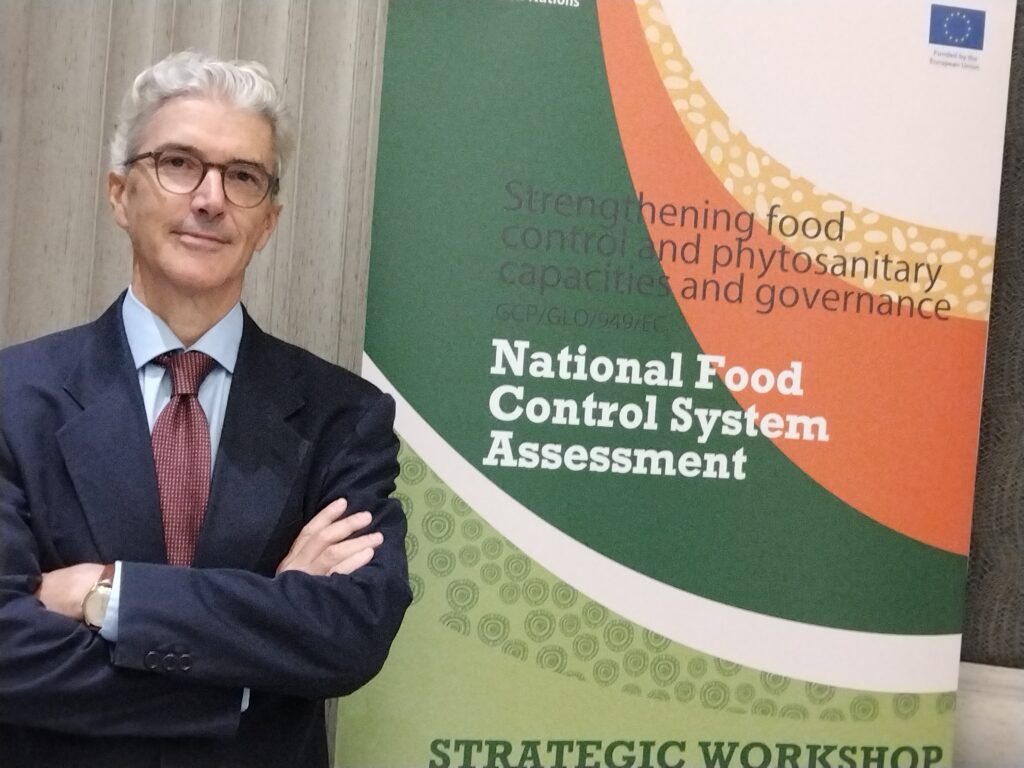Food & Climate
Europe is implementing a carbon tax starting next year (2026), which will negatively impact North African countries’ fertilizer exports to the bloc. However, a European official confirmed to “Food & Climate” platform that the tax will be very limited in the first phase and that Egypt will have a significant competitive advantage in the coming years.
“Phase 1 will start next year, but the tax is very very low in this stage, so i think it will not be a problem for the Egyptian fertilizer exports”, Nikolaos Zaimis, Minister counsellor, and head of trade section in European embassy in Egypt, said.
This came on the sidelines of the Policy Leaders Conference, held by the American Chamber of Commerce in Cairo earlier this week.
Zaimis ruled out the possibility that the carbon tax on fertilizer imports would reach $100 per ton, as former sector officials indicated in press statements, especially in the first years of implementation.
Saad Abu Al-Maati, Secretary-General of the Arab Fertilizer Association, had previously indicated in press statements that the carbon tax would reach $100 per ton of fertilizer.
Egypt has a significant competitive advantage in this area, as it has numerous renewable energy projects. Therefore, in the next few years, it will have greater export advantages than others.
Carbon tax Implementation Schedule

Nikolaos Zaimis, Minister counsellor, and head of trade section in European embassy in Egypt, told “Food & Climate” platform that Carbon tax will be full elemental in 2035 or 2036.
From January 1, 2026, producers of aluminum, fertilizers, cement, steel, and hydrogen, as well as electricity exporters, will be required to pay the tax on CO2 emissions released during the production of the goods they export to the EU.
At the Ministerial Council in December 2024, four carbon pricing models were presented to the Contracting parties. The scenarios differ in structure and scope, but all support a common goal: progressive alignment with the EU ETS and the implementation of the polluter-pays principle.
The Ministerial Council is expected to meet in July to reflect on these scenarios and decide on the preferred regional pathway. This decision will shape the revision of the Decarbonization Roadmap and guide the implementation of carbon pricing reform up to 2030 and beyond.
To avoid distortions and ensure a level playing field, timely carbon pricing implementation is essential. “The projections shows that if the region (the Western Balkans) would join EU ETS after 2030, the carbon price should reach or even exceed 100 euros per ton of CO2.
This would have serious consequences for energy prices, competitiveness and industrial exports. Also, delaying actions could prove to be costly. That’s why contracting parties are expecting to implement domestic ETS for electricity with the price equivalent to EU ETS”, Milica Brkić Vukovljak, from Energy Agency of the Republic of Serbia, explained, according to “Balkan Green Energy News“.
182,000 Importers Exempted from Carbon Tax
The EU’s Carbon Border Adjustment Mechanism (CBAM) is the EU’s tool to put a fair price on the carbon emitted during the production of carbon intensive goods that are entering the EU, and to encourage cleaner industrial production in non-EU countries, according to European commission website.
By confirming that a price has been paid for the embedded carbon emissions generated in the production of certain goods imported into the EU, the CBAM will ensure the carbon price of imports is equivalent to the carbon price of domestic production, and that the EU’s climate objectives are not undermined. The CBAM is designed to be compatible with WTO-rules.
But a few dayes ago, lawmakers in the European Parliament voted 564 – 20 to approve proposed changes to approve proposed changes to the Carbon Border Adjustment Mechanism (CBAM), the EU’s carbon tax on imported goods, which would exempt the vast majority of importers from the CBAM rules, while allowing the mechanism to continue to cover nearly all emissions from imports across key carbon-intensive sectors.
Many of the most significant measures proposed by the Omnibus package are targeted at smaller businesses, in alignment with the recent release by the Commission of its “Competitiveness Compass” aimed at boosting Europe’s productivity and global competitiveness, which included goals to reduce reporting burdens by at least 25% for all companies, and 35% for SMEs.
The most significant change to CBAM under the Commission’s proposals is the introduction of a new 50 tonne threshold, eliminating 90% of importers – primarily small and medium-sized enterprises – from the scope of the regulation.

Despite removing approximately 182,000 importers, however, the Commission said that more than 99% of emissions from iron, steel, aluminum and cement imports will still be covered by CBAM. The new proposals also include simplifications around the calculation of emissions and other reporting requirements, according to “ESG Today“.

